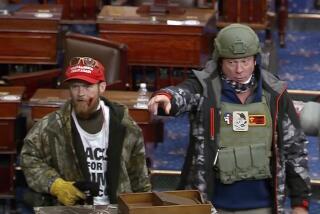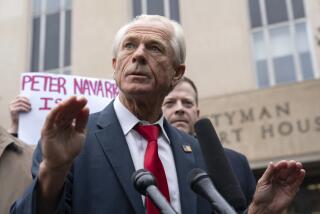Obama administration won’t pursue civilian trials for 9/11 suspects
The Obama administration admitted defeat in its efforts to prosecute the self-described mastermind of the Sept. 11, 2001, terrorist attacks before a civilian jury in New York City, announcing that Khalid Shaikh Mohammed and four others would be tried by a military commission at the U.S. naval base in Guantanamo Bay, Cuba.
The decision, announced Monday by Atty. Gen. Eric H. Holder Jr., marks a sharp political setback for President Obama, who had repeatedly pledged to use civilian courts to try “high-value” terrorism suspects. It also creates fresh uncertainty about the legal road ahead for senior Al Qaeda suspects now in custody.
A federal judge in Manhattan promptly dismissed a sealed grand jury indictment from December 2009 against Mohammed and the four others pending transfer of the case to the military tribunal. The existence of the 10-count, 81-page federal indictment against the five men was not previously known.
Several hours later, Navy Capt. John Murphy, chief prosecutor in the Pentagon’s Office of Military Commissions, announced that charges would be filed “in the near future” to try the case at Guantanamo. Mohammed and his codefendants are among about 170 detainees at the military prison there.
“I intend to recommend the charges be sent to a military commission for a joint trial,” Murphy said, adding that his office already was preparing its case.
In 2007, during a combatant status review tribunal hearing at Guantanamo, Mohammed confessed to the Sept. 11 conspiracy, as well as other lethal terrorist plots, and asked to be put to death. If military prosecutors seek the death penalty, he will not be allowed to plead guilty under the rules of military justice and will have to stand trial.
Mohammed’s U.S. interrogators subjected him to waterboarding, a process that simulates drowning, 183 times in March 2003, shortly after he was captured in Pakistan, according to a report by the CIA. None of the statements given under such harsh interrogation procedures can be used against him, according to Obama administration policies.
By moving the trials to civilian court, Obama had hoped to demonstrate the fairness of the U.S. justice system. Civilian proceedings are more transparent and include civilian judges and jurors. In military tribunals, judge and jury are military officers.
But critics feared that a trial on U.S. soil would trigger terrorist reprisals and require an enormous outlay of funds for security. Many also worried that stricter standards for admissible evidence could result in more acquittals and lenient sentences.
Holder said at a news conference that he and the White House “reluctantly” reversed course because Congress passed legislation in December barring the use of federal funds to transfer detainees from Guantanamo to the U.S. In addition, he said, relatives of the nearly 3,000 people who were killed almost a decade ago in the attacks in New York, Pennsylvania and at the Pentagon were losing patience.
Holder said he was confident prosecutors would have prevailed in New York but took solace that the cases would proceed in the military system.
The New York indictment listed all of those who were killed, filling 36 pages.
“For the victims of these heinous attacks and their families, justice is long overdue, and it must not be delayed any longer,” Holder said.
At the White House, Press Secretary Jay Carney suggested that the need to bring the five suspects to trial drove the decision to hand them to the military legal system. The administration has spent 15 months reviewing possible trial venues outside Guantanamo, including a vacant state prison in Thomson, Ill.
“The president’s commitment here is this: Those who are suspected and accused of participating in those heinous attacks be brought to justice,” Carney said. “That is his primary concern.”
The decision, announced on the same day that Obama opened his reelection campaign, reflected a realization that the president cannot overcome political opposition to civilian prosecution of Guantanamo detainees and that he had to shelve his campaign promise to shutter the detention camp at the naval base.
On Capitol Hill, those who opposed a New York trial and sought to keep the Guantanamo prison open applauded the announcement.
Sen. Jeff Sessions (R-Ala.) said Obama’s campaign promises were “built on the naive premise that softening America’s image would somehow soften our enemies’ resolve.”
On the Democratic side, Sen. Charles E. Schumer of New York said the reversal was “the final nail in the coffin of a wrongheaded idea.”
But in interviews, some New Yorkers castigated Obama for changing course.
“It’s a complete, utter failure of political courage,” said Ron Kuby, a high-profile lawyer who has defended terrorism suspects in the New York area. “Khalid Shaikh Mohammed won this, and with Republican help and the failure of the administration.”
Karen Greenberg, who runs New York University’s Center on Law and Security, which tracks terrorism prosecutions, said the military commission system is untried, unknown and too secretive. Trusting that system, she said, is like “putting your head in the sand.”
The 2009 federal court indictment had charged Mohammed, Walid bin Attash, Ramzi Binalshibh, Ali Abdul Aziz Ali and Mustafa Ahmed Hawsawi with murder, air piracy and acts of terrorism, which could have brought them the death penalty.
The indictment charged Mohammed, a close ally of Al Qaeda leader Osama bin Laden, with proposing in 1999 to coordinate a plot that would use airplanes as missiles to crash into buildings. From that moment on, the indictment says, Mohammed wore the title of “operational leader” of the Sept. 11 plot.
Attash allegedly collected information on U.S. airports and airplane security. Binalshibh and Ali tried to enlist as pilot hijackers but failed to obtain U.S. visas, the indictment says. Instead, it says, they sent tens of thousands of dollars in wire transfers to the pilots and their musclemen inside the United States.
Hawsawi was charged with helping the hijackers enter this country.
Monday’s decision ends speculation that any terrorism detainees will be moved to the empty Illinois state prison in Thomson, although the U.S. Bureau of Prisons still hopes to use it someday for federal prisoners. The government’s attempted purchase of the prison has been waylaid by budget cuts and GOP objections to housing Mohammed and other high-profile Guantanamo detainees there.
“The fate of Thomson is on the table,” said Assistant Majority Leader Richard J. Durbin (D-Ill.). But, he said, “if cuts proposed by House Republicans continue, it will be impossible.”
Christi Parsons in the Washington bureau and Times staff writer Geraldine Baum in New York contributed to this report.
More to Read
Start your day right
Sign up for Essential California for news, features and recommendations from the L.A. Times and beyond in your inbox six days a week.
You may occasionally receive promotional content from the Los Angeles Times.







